Stock Market New Opportunities
Companies / Company Chart Analysis Nov 08, 2009 - 03:47 PM GMTBy: Jay_DeVincentis
 As the market bottoms, it creates new opportunities - here are several.
As the market bottoms, it creates new opportunities - here are several.
The Penny Stock Report
There is nothing more exciting then grabbing a penny stock and riding it for huge gains!
In this report, we'll scan the market for such opportunities. With several thousand stocks in the market, finding trades is a challenge for every investor.
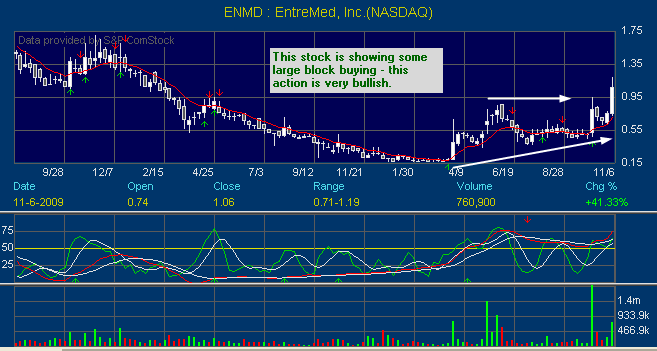
Penny stocks, by my definition are stocks that trade under $5 per share. And while these stocks are 'high' risk, and I wouldn't allocate the same capital that you would a normal portfolio position, they are also high reward, so you can take much smaller risk amounts of capital - and the rewards can be worth it.
These are not 'bad' stocks. They've just been forgotten by the market. When the market goes through a bearish move, liquidity comes out of the market. It can be a hedge or mutual fund that simply needs to meet redemptions, and are forced to sell holdings, good or bad. These smaller stocks see their prices drop - significantly.
Trading tactics:
Trading these issues can be more difficult. The shares are much more volatile, so you may not be able to utilize tight stops. They need a little more room to move.
The smaller cap stocks can be easily manipulated - which can be a good thing if it is to the upside.
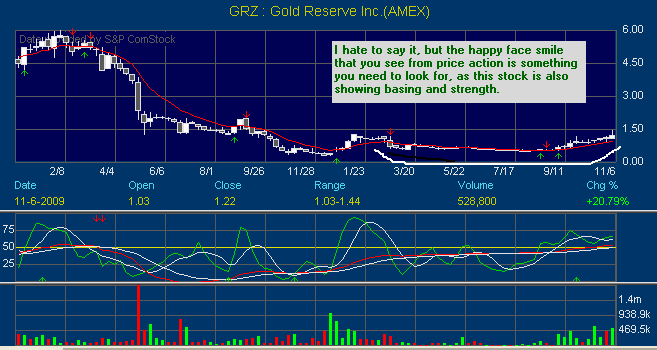
The best returns are going to be as the market re-inflates - when liquidity returns, as they say, a rising tide will lift all boats - and it is no more evident than in these low priced issues. The liquidity effect is so evident here as mutual and hedge funds put new money back to work - usually in the same issues that they were forced to sell. You see, some of these low priced stocks are not bad companies, it is merely a case when there is not enough liquidity to go around, and it has to get pulled from somewhere. And vice versa.
If you are going to use a stop, I'd apply the 3:1 rule off your projection- so if you think you can obtain 60% profits, which isn't unheard of, you can keep your stop around the 20% level.
Patterns to look for:
These stocks are just like every other stock in the market - so you can apply the same tactics that you apply with other stocks. Here are a few points to consider though.
First and foremost, stocks that go through a large move lower, will tend to have a symmetrical move back up as they re-inflate with the market.
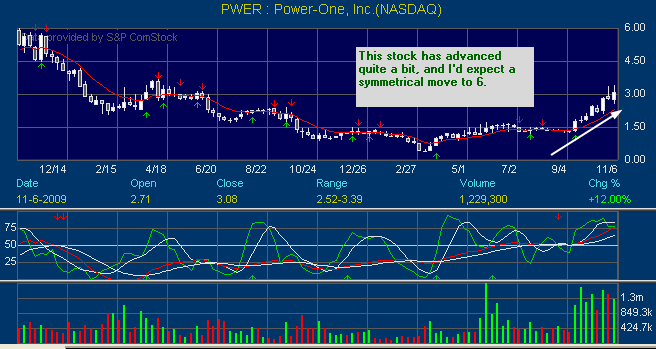
Break out trading - this is my favorite play. Low priced stocks will peak out at a level or resistance. Place a BUY STOP MARKET ORDER just above resistance. This will get you in the trade.
Trend trading - to employ longer term tactics, look at a weekly chart and use a 10 week moving average as your stop. Try to enter on a break of the 10-week moving average. However, if you miss it, you can wait for a pull back to the 10 week before entering.
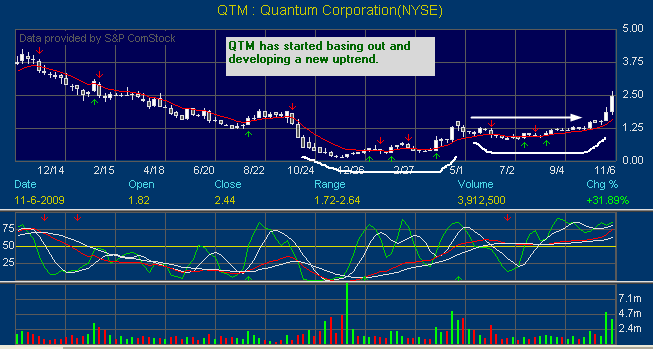
Pattern Trading - like break out trading, I'd employ a strategy to enter on the break of the pattern. Remember, you also want to see the pattern break on volume. So if you enter and the break is not on volume, then tighten your stop. It doesn't mean that the trade isn't going to be successful. It just means the likelihood of success is less.
Swing Trading - The interesting thing about penny stocks during an advance phase, is that they tend to step higher, so you may not get the swing you are looking for. Look for this stepping action and try to buy near where the step meets the riser.
Other considerations:
Float is still a consideration with Penny Stocks. Low float stocks can move even more than high float stocks. This is definitely something to consider based on your age. Younger investors should be looking at smaller companies with more potential to grow.
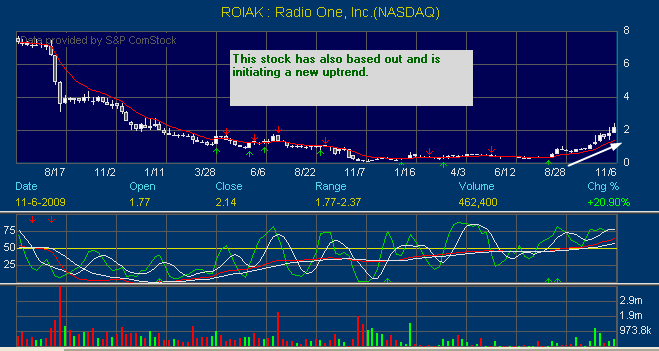
Why? Because 100 shares in a young growth company can become 6400 shares after the 6 stock splits the top growth companies normally goes through over a decade. Older investors, looking for more stability (yes, even in penny stocks), should look at larger companies.
Capital allocation strategies:
There's a saying in Wall Street that goes "Buy when they sleep, sell when they leap." If you're investing - obviously you can spread around smaller amounts of capital to more potential trades and give yourself a higher likelihood of capturing a larger gain. But the more you spread your capital around, the less you will make.
Everyone's perspective is slightly different. What I should be doing is different from you and different from the person next to you. Some seek more growth and some seek more stable income.
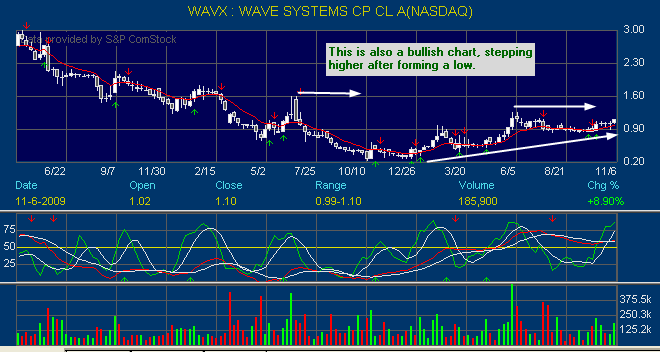
Capital allocation is such an individual concern based on your own financial position.
However, one basic example and strategy that you can employ is - say you were to invest 10k normally in a stock. Instead, take that 10k and divide it up into 10 potential trades. Identify 10 stocks to trade off our list and place your conditional orders. As each order gets executed, then employ a strategy to reallocate the capital in the orders that haven't been executed into the stocks that have been executed and are moving higher. For example, if 3 positions are entered, make it a rule to double your investment every week that the stocks close higher. That will focus your 10k into the stocks that are moving higher.

Stocks are listed in order of price, lowest to highest.
If you have any questions or comments, email me at Jay@stockbarometer.com.
Regards,
By Jay DeVincentis
Stock Barometer Premier Membership Receive 5 Newsletters, including the Daily Stock Barometer, Stock Options Speculator, QQQQ/Rydex Trader, Market Chat & Explosive Stock Alert FOR ONE LOW PRICE.
Important Disclosure
Futures, Options, Mutual Fund, ETF and Equity trading have large potential rewards, but also large potential risk. You must be aware of the risks and be willing to accept them in order to invest in these markets. Don't trade with money you can't afford to lose. This is neither a solicitation nor an offer to buy/sell Futures, Options, Mutual Funds or Equities. No representation is being made that any account will or is likely to achieve profits or losses similar to those discussed on this Web site. The past performance of any trading system or methodology is not necessarily indicative of future results.
Performance results are hypothetical. Hypothetical or simulated performance results have certain inherent limitations. Unlike an actual performance record, simulated results do not represent actual trading. Also, since the trades have not actually been executed, the results may have under- or over-compensated for the impact, if any, of certain market factors, such as a lack of liquidity. Simulated trading programs in general are also subject to the fact that they are designed with the benefit of hindsight. No representation is being made that any account will or is likely to achieve profits or losses similar to those shown.
Investment Research Group and all individuals affiliated with Investment Research Group assume no responsibilities for your trading and investment results.
Investment Research Group (IRG), as a publisher of a financial newsletter of general and regular circulation, cannot tender individual investment advice. Only a registered broker or investment adviser may advise you individually on the suitability and performance of your portfolio or specific investments.
In making any investment decision, you will rely solely on your own review and examination of the fact and records relating to such investments. Past performance of our recommendations is not an indication of future performance. The publisher shall have no liability of whatever nature in respect of any claims, damages, loss, or expense arising out of or in connection with the reliance by you on the contents of our Web site, any promotion, published material, alert, or update.
For a complete understanding of the risks associated with trading, see our Risk Disclosure.
© 2009 Copyright Jay DeVincentis - All Rights Reserved
Disclaimer: The above is a matter of opinion provided for general information purposes only and is not intended as investment advice. Information and analysis above are derived from sources and utilising methods believed to be reliable, but we cannot accept responsibility for any losses you may incur as a result of this analysis. Individuals should consult with their personal financial advisors.
© 2005-2022 http://www.MarketOracle.co.uk - The Market Oracle is a FREE Daily Financial Markets Analysis & Forecasting online publication.



